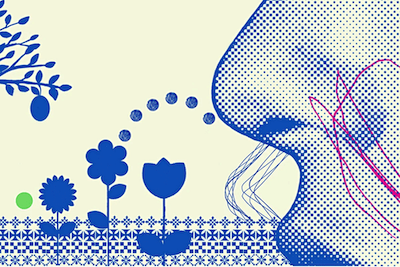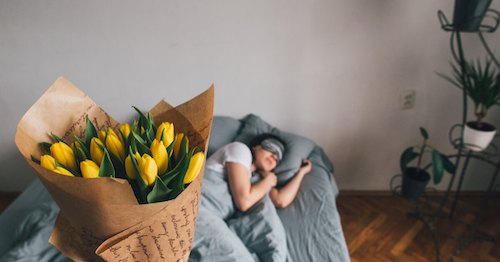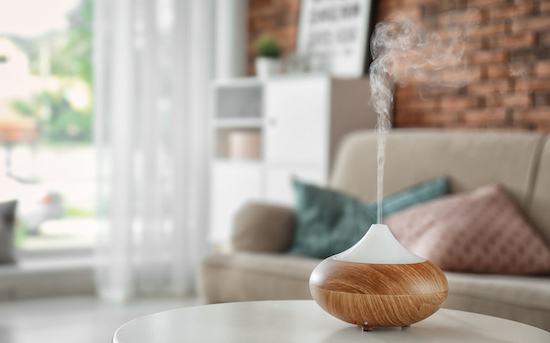Last Updated on Sunday, May 5, 2024 by Maven Carlson
Have you ever spent sleepless nights in a stuffy room, desperately trying to get a good night’s rest? The role that smells plays in your sleep might surprise you. Studies have discovered links between smells and the quality of sleep we get.
Research suggests that certain scents can help us relax and even fall asleep faster. Lavender has been found to be particularly effective as an aromatherapy scent for people who struggle with insomnia or difficulty staying asleep throughout the night. If you love essential oils, adding lavender to your evening routine may be a great way to prepare for a good night’s rest!
By understanding how smell plays a role in our sleep, we can create an environment that is more conducive to quality sleep. So, we need to keep an eye on both the sights and smells in your bedroom for optimal sleeping conditions like the best temperature for sleep!
Relationship Between Smell and Sleep: An Overview of the Research
Table of Contents
Smell has a direct impact on our sleep. Recent research has explored how different odors can influence both falling asleep and sleeping through the night. Researchers have studied the effects of essential oils and other scents to determine which ones might be best for creating an environment conducive to quality sleep. Though much of the research is still ongoing, it’s clear that smell does play a role in getting restful sleep.
The Circadian Rhythm and Smell

Our circadian rhythm is a 24-hour cycle that helps regulate our sleep-wake schedule. Research shows that smells can also help to set this internal clock, which in turn impacts our ability to fall asleep and stay asleep. Certain scents can act as a cue that it’s time to rest, while others may disrupt the circadian rhythm and make it harder to get quality sleep.
Aromatherapy and Sleep
The practice of aromatherapy uses essential oil diffusers or candles to spread the scent around a space for therapeutic purposes. Essential oils like lavender have been found to be particularly effective at helping people relax and sometimes even fall asleep faster. Other scents like chamomile, lemon balm, and bergamot have also been linked to improved sleep quality.
The Impact of Unpleasant Smells
However, not all smells can help us get better sleep. Unpleasant odors like cigarette smoke, artificial fragrances, or even food can be disruptive to the circadian rhythm and make it harder for us to achieve restful sleep. It’s important to keep our bedrooms free from these kinds of strong odors in order to create an environment that is conducive to good sleep.
In conclusion, a growing body of research suggests that smell does play a role in how well we are able to rest at night. By being conscious of both the pleasant and unpleasant scents in our bedroom, we can create a more sleep-friendly environment for ourselves.
Can Certain Smells Help You Sleep Better?
Studies have shown that certain scents can help you get better sleep. Aromatherapy, which utilizes essential oils, has been found to be particularly effective in improving relaxation and helping people fall asleep faster. Additionally, keeping the bedroom free from strong odors like smoke or artificial fragrances can make it easier to achieve restful sleep. So if you’re looking for a way to improve your sleep quality without medication or supplements, experimenting with different smells may be the answer!
What Are the Best Scents for Sleep?

Researchers are continuing to explore the impact of different smells on sleep quality. So far, essential oils like
- Lavender: Lavender has been found to be particularly effective at helping people relax and even fall asleep faster.
- Chamomile: Chamomile is known for its calming properties, which can make it easier to drift off into a peaceful sleep.
- Lemon Balm: Lemon balm is another essential oil that can help promote relaxation and improve sleep quality.
- Bergamot: Bergamot oil has also been linked to improved sleep quality.
- Cedar Extract: Cedar extract has been found to enhance the benefits of aromatherapy and help people fall asleep faster.
- Ylang-Ylang: Ylang-Ylang oil is known for its calming properties and can be used to promote restful sleep.
It’s important to remember that everyone responds differently to different smells, so experimentation may be necessary in order to find the perfect scent for you! Additionally, it’s a good idea to consult with your doctor before using any essential oils or other scents as part of an aromatherapy routine.
By understanding how smell plays a role in our sleep, we can make adjustments to create a more sleep-friendly environment. Incorporating scents that promote relaxation is a great way to start improving your sleeping habits!
What Are the Best Scents To disrupt Sleep?
In contrast to the scents that encourage restful sleep, there are also certain odors that can make it harder for us to drift off. Strong smells like cigarette smoke or artificial fragrances can be disruptive to our internal clocks and cause difficulty sleeping.
- Coffee: The smell of coffee can be stimulating and make it harder for our bodies to wind down.
- Garlic: Garlic is known for its strong pungent scent which can be distracting at night.
- Alcohol: The odor of alcohol has been found to interfere with deep sleep cycles.
- Peppermint: Peppermint can be invigorating and make it harder for us to relax and fall asleep.
It’s important to avoid these types of smells in order to create a bedroom environment that is conducive to good sleep. Additionally, food smells can also make it difficult for us to relax and fall asleep. So if you’re looking for ways to improve your sleep quality, making sure your bedroom is free from unpleasant odors may be just what you need!
FAQ: About How Smell Affects Sleep
What smells cause sleepiness?
Aromatherapy utilizing essential oils like lavender, chamomile, lemon balm, and bergamot can help promote relaxation and improve sleep quality.
What smells keep you awake?
Strong odors like cigarette smoke or artificial fragrances can interfere with our internal clocks, making it harder to fall asleep. Additionally, food smells and the smell of coffee can also make it difficult for us to relax and drift off into a peaceful sleep.
Does smelling things in the morning help you feel more awake?
Yes! Certain scents like citrus, mint, and even coffee can help invigorate the senses and make us feel more awake in the morning. Additionally, it is also important to keep strong odors out of the bedroom in order to establish a healthy sleep routine.
Can certain scents help me stay asleep longer?
Yes! Research has found that certain scents can have a positive effect on our ability to stay asleep longer. Essential oils such as cedar extract, ylang-ylang, and other calming aromas can be used to promote restful sleep. Additionally, avoiding strong smells and food odors can also create a more conducive environment for longer, deeper sleep.
Can some person’s smell make you sleepy?
While there is no scientific evidence to suggest that a person’s individual scent can have an effect on sleep, it can be said that pleasant smells in general can help promote relaxation. Additionally, essential oils like lavender and chamomile have been found to be particularly effective at helping people relax and even fall asleep faster.
Can Smell During Sleep Improve Memory?
Recent research has shown that exposing yourself to specific scents during sleep can help improve memory recall and encoding. For example, one study found that participants who were exposed to the scent of rosemary while sleeping remembered more information than those who did not have any scent exposure. While this is still an area of ongoing research, these findings suggest that scents may play a role in improving our ability to remember things.

Leave a Reply